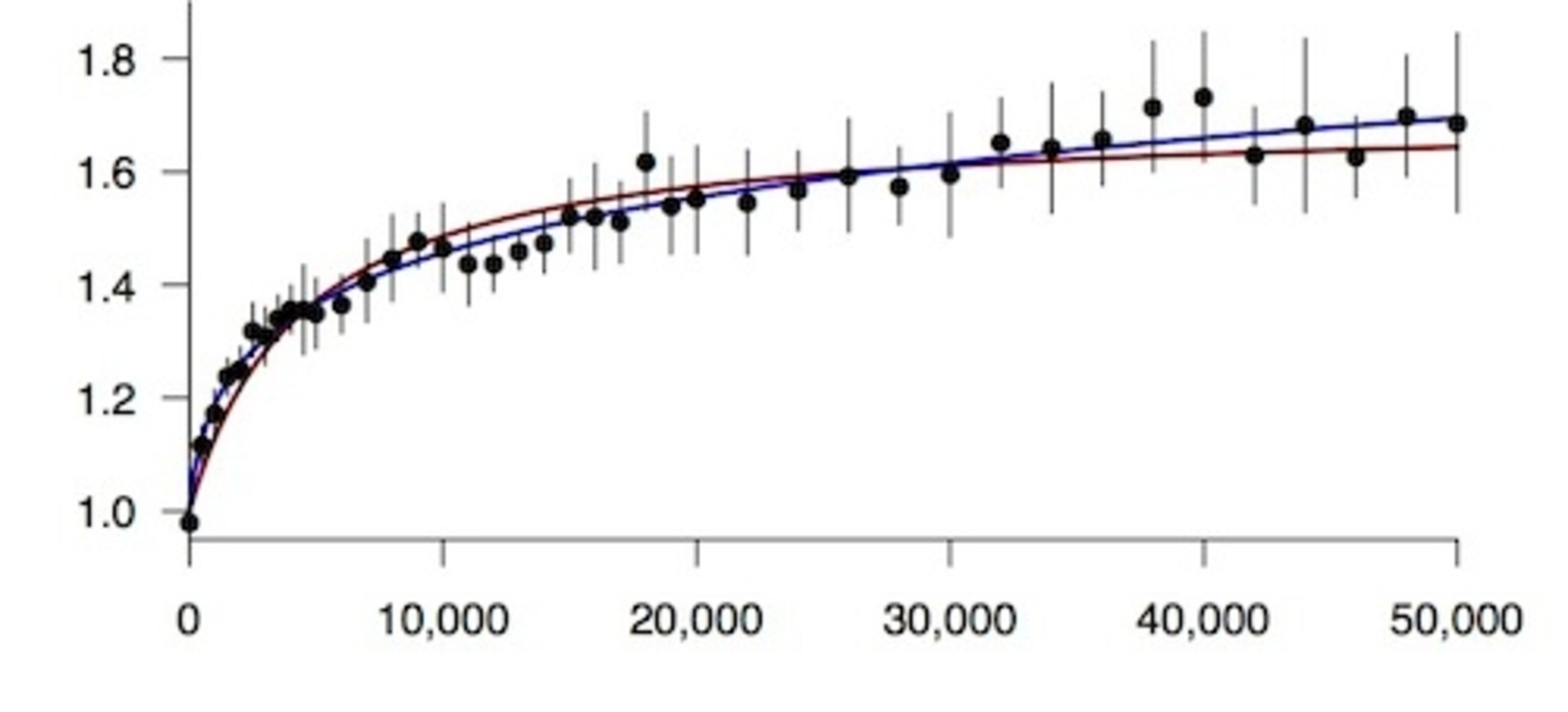One of the things I like about a long-running blog is that I can revisit long-running stories whenever I feel like it. And one of the longest of those stories has been unfolding in a lab at Michigan State University since 1988. That year, a biologist named Richard Lenski began rearing Escherichia coli from a single microbe. The bacteria, which he raised in a dozen separate flasks, all faced the same challenge: endure a starvation diet that their lab-pampered ancestors had not suffered.

Every few hours, the bacteria reproduced. Each morning, the scientists took a few drops from each flask and moved these colonists to a fresh flask. Mutations arose, which the descendants inherited. Some helped the bacteria grow faster than their cousins, and natural selection spread them across the population.
It’s been 25 years–and 50,000 generations–since Lenski started the experiment, and it just won’t quit. Here are a few of the pieces I’ve written about it over the years:
–In 2007, I wrote about Lenski and the field of experimental evolution for the New York Times.
–In 2008, I dedicated a chapter to Lenski’s work in my book, Microcosm, which is a biography of E. coli.
–In 2009, I wrote a magazine feature for BBC Knowledgea magazine feature for BBC Knowledge
–One of Lenski’s lines of bacteria even went off in an unexpected direction, evolving the ability to feed on citrate in the presence of oxygen. This might represent the birth of a new species. I blogged about that research here and here.
Yet there is still more to learn from these bugs. In this week’s Science, Lenski and two members of his lab–Michael J. Wiser and Noah Ribeck–took a close look at the evolution of the bacteria over the course of the entire experiment.
a close look at the evolution of the bacteria over the course of the entire experiment.
One of the great strengths of this experiment is that Lenski is an obsessive hoarder. He and his team freeze bacteria every 500 generations, filling freezer after freezer with them. They can then thaw out a few of the bacteria and put them in a dish with the latest generation and see how fast they each grow under identical conditions. Think of it as microbial Hunger Games.
These contests allow the scientists to precisely gauge what’s known as relative fitness–a measurement of natural selection. In the early years of the experiment, the fitness of the bacteria rose very fast. Within 5,000 generations, all twelve lines were growing 50% faster than the original microbe Lenski started the experiment with. Then they slowed down. By 20,000 generations, they were 75 percent faster.
These results lead to an obvious question: were the bacteria coming to the end of their increase in fitness? You can think of evolution in these cases like a mountain, with the elevation of any spot on the mountain as the average fitness of a population. Perhaps the mountain the bacteria in Lenski’s lab were climbing had steep slopes at low elevations. But now they were getting to the gentle climb just before reaching the mountain’s peak.
So the scientists thawed out some bacteria and pitted them against each other. Even at 50,000 generations, it turns out, the bacteria are still getting faster. Between generations 40,000 and 50,000, their fitness increased by 3 percent.
The scientists then competed the newest bacteria against ancestors from 41 generations across the past 25 years. They plotted the data on a graph and then looked for the curve that fit the dots best. The data do not indicate the mountain is going to flatten out. Instead, the best curve is generated by a mathematical relationship called a power law. In this model, the bacteria will improve by smaller steps in the future, but they will never stop improving. The power law is so powerful that the scientists can plug data into it only up to generation 20,000 and then accurately predict the next 30,000 generations.

To explain this result, the scientists turned to some of the previous experiments that researchers have carried out on Lenski’s bugs. Over the years, they’ve looked closely at the DNA of some of the bacteria, in order to pinpoint new mutations and track them over the generations. By 20,000 generations, the bacteria had already acquired several dozen beneficial mutations. If the scientists engineered the ancestral bacteria with each of those mutations, they grew faster.
These adaptations arose thanks to the fact that mutations spontaneously occur at random in the bacteria. Most of the mutations are harmful, either killing the bacteria outright or slowing down their grow so that their descendants eventually disappear from their flask. But a few are beneficial.
Of all the possible beneficial mutations, most of them provide a small benefit, while a few provide big ones. After a few thousand generations, most of the big mutations probably occurred, leaving only small ones to continue improving the bacteria. And each time a new mutation arises, it has to interact with all the mutations that came before it. Some of those interactions may actually be harmful to the bacteria, reducing the overall benefit. The more time passes, the more mutations there are that may impose that cost.
Yet the experiment also shows that the bacteria still have the capacity to grow even faster. There’s a creativity in the genome that is inexhaustible–despite the fact that just about every spot in the microbe’s DNA has mutated by now. Again, the interaction between mutations gets the credit. In some cases, mutations can’t be beneficial until a series of other beneficial mutations have first evolved.
The creativity of evolution means that this experiment will keep yielding results for a long time. It’s possible that eventually the bacteria will hit some ceiling imposed by physics. There may be an upper limit to how fast DNA can be copied, for example, or how thick cell walls can get.
But no one knows when the bacteria will hit that wall. Lenski and his colleagues estimate that if they could run the experiment for another million years, the bacteria would keep speeding up. Today it takes one microbe 55 minutes to become two. In a million years (or 2.5 billion generations) it would take 23 minutes.
Lenski’s getting towards retirement, so he won’t be running a million-year experiment. Perhaps someone can create a robotic, solar-powered time capsule to take over. As long as the experiment can run, these bacteria will be ready to surprise.
PS: After 25 years, Lenski has evolved too–he has started to blog. Here’s his own post on the new paper.
